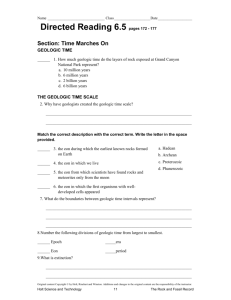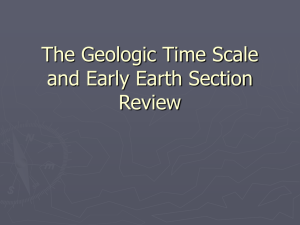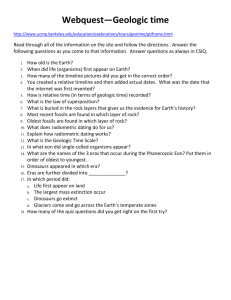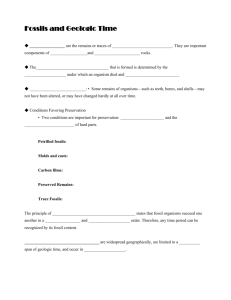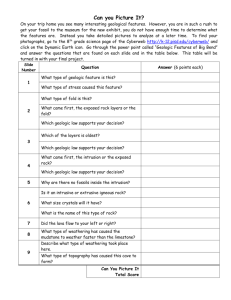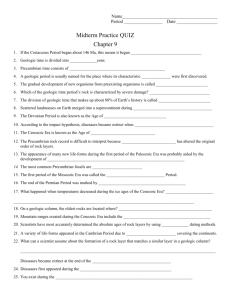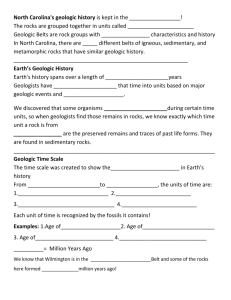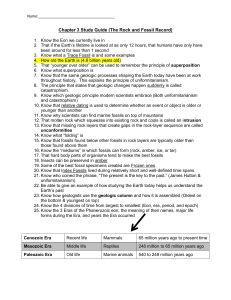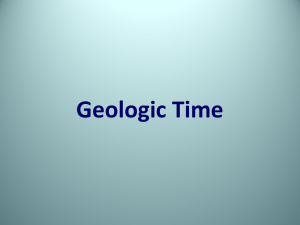9.1 Directed Reading Guide
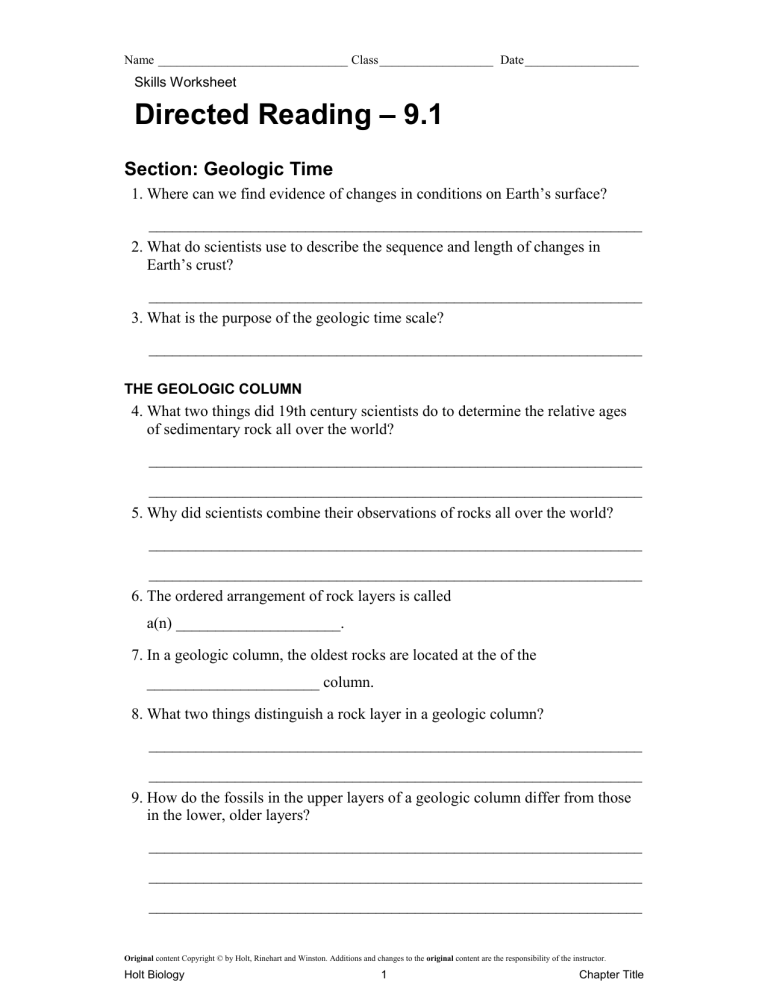
Name ______________________________ Class __________________ Date __________________
Skills Worksheet
Directed Reading – 9.1
Section: Geologic Time
1. Where can we find evidence of changes in conditions on Earth’s surface?
_______________________________________________________________
2. What do scientists use to describe the sequence and length of changes in
Earth’s crust?
_______________________________________________________________
3. What is the purpose of the geologic time scale?
_______________________________________________________________
THE GEOLOGIC COLUMN
4. What two things did 19th century scientists do to determine the relative ages of sedimentary rock all over the world?
_______________________________________________________________
_______________________________________________________________
5. Why did scientists combine their observations of rocks all over the world?
_______________________________________________________________
_______________________________________________________________
6. The ordered arrangement of rock layers is called a(n) _____________________.
7. In a geologic column, the oldest rocks are located at the of the
______________________ column.
8. What two things distinguish a rock layer in a geologic column?
_______________________________________________________________
_______________________________________________________________
9. How do the fossils in the upper layers of a geologic column differ from those in the lower, older layers?
_______________________________________________________________
_______________________________________________________________
_______________________________________________________________
Original content Copyright © by Holt, Rinehart and Winston. Additions and changes to the original content are the responsibility of the instructor.
Holt Biology 1 Chapter Title
Name ______________________________ Class __________________ Date __________________
Directed Reading continued
10. Many of the fossils that have been discovered in the oldest layers of rock have been ______________________for millions of years.
11. When the first geologic columns were developed, what factors did scientists use to estimate the ages of rock layers?
_______________________________________________________________
_______________________________________________________________
12. What method has enabled scientists to determine the ages of rock layers more accurately?
_______________________________________________________________
13. Suppose a scientist wants to determine the age of a rock layer with a geologic column. With what does the scientist compare the rock layer?
_______________________________________________________________
_______________________________________________________________
14. Suppose a layer of rock matches a layer on the geologic column. What does this tell a scientist?
_______________________________________________________________
DIVISIONS OF GEOLOGIC TIME
15. What three indicators do geologists use to divide the geologic time scale into smaller units?
_______________________________________________________________
16. How are rocks grouped within each unit of geologic time similar?
_______________________________________________________________
17. A unit of geologic time is usually characterized by
______________________of a dominant life-form.
18. What does the abbreviation Ma stand for?
_______________________________________________________________
19. When did Precambrian time begin?
_______________________________________________________________
20. What species were common during the Cambrian Period?
_______________________________________________________________
_______________________________________________________________
Original content Copyright © by Holt, Rinehart and Winston. Additions and changes to the original content are the responsibility of the instructor.
Holt Biology 2 Chapter Title
Name ______________________________ Class __________________ Date __________________
Directed Reading continued
21. What happened to the atmosphere during the Ordovician Period?
_______________________________________________________________
22. When did the Silurian Period begin?
_______________________________________________________________
23. During which period did the age of fishes begin?
_______________________________________________________________
24. In what era was the Carboniferous Period?
_______________________________________________________________
25. In North America, into what two periods is the Carboniferous Period divided?
_______________________________________________________________
26. What was the dominant life-form of the Jurassic Period?
_______________________________________________________________
27. What marked the end of the Mesozoic Era?
_______________________________________________________________
28. In which epoch did the age of mammals begin?
_______________________________________________________________
29. When did the Eocene Epoch begin?
_______________________________________________________________
30. In what epoch did large carnivores appear?
_______________________________________________________________
31. In what period was the Pleistocene Epoch?
_______________________________________________________________
32. In what epoch did complex human societies develop?
_______________________________________________________________
33. The largest unit of geologic time is called a(n)______________________.
34. Name the four eons into which geologic time is divided.
_______________________________________________________________
_______________________________________________________________
35. The Hadean eon, the Archean eon, and the Proterozoic eon make up an interval called______________________.
Original content Copyright © by Holt, Rinehart and Winston. Additions and changes to the original content are the responsibility of the instructor.
Holt Biology 3 Chapter Title
Name ______________________________ Class __________________ Date __________________
Directed Reading continued
36. Why is it difficult to divide Precambrian time into smaller time units?
_______________________________________________________________
37. An eon is divided into smaller units of geologic time called______________________.
38. The first era of the Phanerozoic eon was the______________________.
39. The Paleozoic Era lasted about______________________.
40. What kinds of fossils are found in rocks from the Paleozoic Era?
_______________________________________________________________
41. The era after the Paleozoic Era was the______________________.
42. What kinds of fossils are found in rocks from the Mesozoic Era?
_______________________________________________________________
43. The present geologic era is called the______________________.
44. When did the present geologic era begin?
_______________________________________________________________
45. What kinds of fossils are common in Cenozoic rocks?
_______________________________________________________________
46. An era is divided into shorter time units called______________________.
47. How do geologic periods get their names?
_______________________________________________________________
48. A period may be divided into smaller units called______________________.
49. Why can scientists not always divide a period into epochs?
_______________________________________________________________
_______________________________________________________________
50. An epoch may be divided into shorter units called______________________.
51. How is an age defined?
_______________________________________________________________
_______________________________________________________________
Original content Copyright © by Holt, Rinehart and Winston. Additions and changes to the original content are the responsibility of the instructor.
Holt Biology 4 Chapter Title
ANSWER KEY
Original content Copyright © by Holt, Rinehart and Winston. Additions and changes to the original content are the responsibility of the instructor.
Holt Biology 5 Chapter Title
